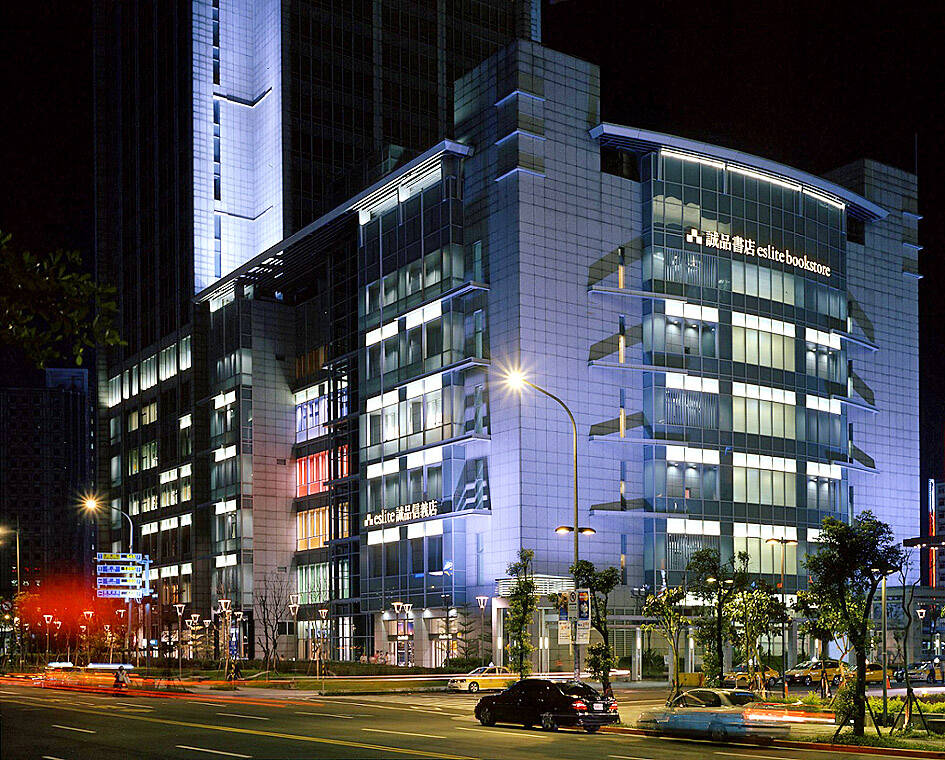Eslite Spectrum Corp (誠品生活), which runs the Eslite bookstore chain, department stores and leisure lifestyle services in Taiwan and abroad, yesterday said that its outlet at Taipei’s prime Xinyi District (信義) would close at the end of this year because its lease is set to expire.
Eslite said in a statement to its suppliers that it has no choice but to shut the 24-hour outlet as the landlords do not intend to renew the contract.
Uni-President Group (統一集團), which owns food manufacturer Uni-President Enterprises Corp (統一企業) and runs the 7-Eleven convenience store chain in Taiwan, is the largest of the Xinyi Eslite store’s seven landlords and reportedly seeks to turn the site into its own department store.

Photo: Chang Hui-wen, Taipei Times
Eslite last year sought to offer its landlords better terms — including higher rent and a larger share of its sales revenue — in a bid to keep the location.
The company did not comment on media reports that the Eslite Spectrum Songyan Store (松菸誠品) at nearby Songshan Cultural and Creative Park would take over the 24-hour operation model.
The Xinyi store, which has books and magazines from more than 4,500 publishers in Taiwan and abroad, has had more than 200 million customers since opening 18 years ago, it said.
The outlet began offering 24-hour services in the spring of 2020 after the Eslite branch on the intersection of Dunhua S Road and Renai Road closed in May that year. That branch had opened in 1989 and began 24-hour operations in 1999, soon growing into a popular tourist venue.
Eslite said it would open a giant store in New Taipei City’s Sindian District (新店) and in Taichung in the second half of this year.

Merida Industry Co (美利達) has seen signs of recovery in the US and European markets this year, as customers are gradually depleting their inventories, the bicycle maker told shareholders yesterday. Given robust growth in new orders at its Taiwanese factory, coupled with its subsidiaries’ improving performance, Merida said it remains confident about the bicycle market’s prospects and expects steady growth in its core business this year. CAUTION ON CHINA However, the company must handle the Chinese market with great caution, as sales of road bikes there have declined significantly, affecting its revenue and profitability, Merida said in a statement, adding that it would

RISING: Strong exports, and life insurance companies’ efforts to manage currency risks indicates the NT dollar would eventually pass the 29 level, an expert said The New Taiwan dollar yesterday rallied to its strongest in three years amid inflows to the nation’s stock market and broad-based weakness in the US dollar. Exporter sales of the US currency and a repatriation of funds from local asset managers also played a role, said two traders, who asked not to be identified as they were not authorized to speak publicly. State-owned banks were seen buying the greenback yesterday, but only at a moderate scale, the traders said. The local currency gained 0.77 percent, outperforming almost all of its Asian peers, to close at NT$29.165 per US dollar in Taipei trading yesterday. The

RECORD LOW: Global firms’ increased inventories, tariff disputes not yet impacting Taiwan and new graduates not yet entering the market contributed to the decrease Taiwan’s unemployment rate last month dropped to 3.3 percent, the lowest for the month in 25 years, as strong exports and resilient domestic demand boosted hiring across various sectors, the Directorate-General of Budget, Accounting and Statistics (DGBAS) said yesterday. After seasonal adjustments, the jobless rate eased to 3.34 percent, the best performance in 24 years, suggesting a stable labor market, although a mild increase is expected with the graduation season from this month through August, the statistics agency said. “Potential shocks from tariff disputes between the US and China have yet to affect Taiwan’s job market,” Census Department Deputy Director Tan Wen-ling

UNCERTAINTIES: The world’s biggest chip packager and tester is closely monitoring the US’ tariff policy before making any capacity adjustments, a company official said ASE Technology Holding Inc (日月光投控), the world’s biggest chip packager and tester, yesterday said it is cautiously evaluating new advanced packaging capacity expansion in the US in response to customers’ requests amid uncertainties about the US’ tariff policy. Compared with its semiconductor peers, ASE has been relatively prudent about building new capacity in the US. However, the company is adjusting its global manufacturing footprint expansion after US President Donald Trump announced “reciprocal” tariffs in April, and new import duties targeting semiconductors and other items that are vital to national security. ASE subsidiary Siliconware Precision Industries Co (SPIL, 矽品精密) is participating in Nvidia